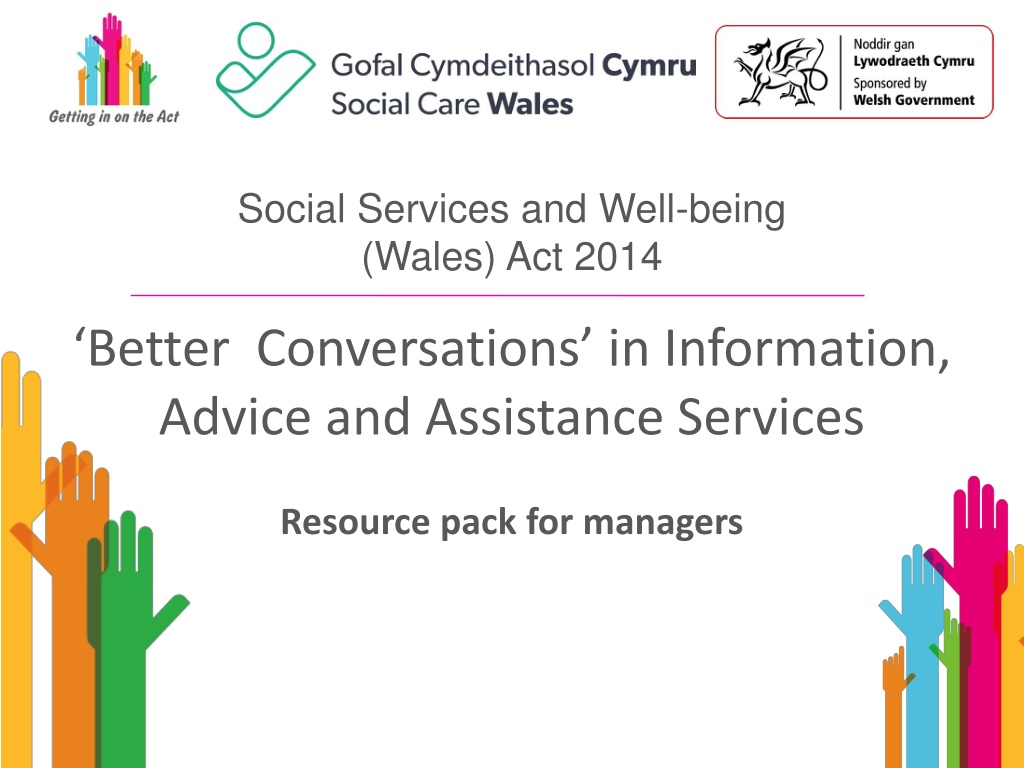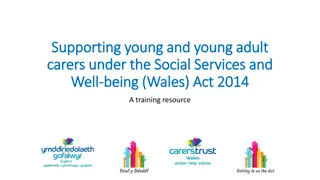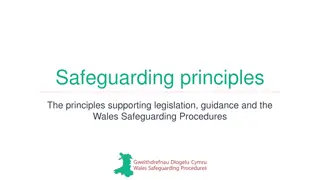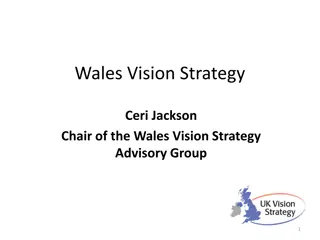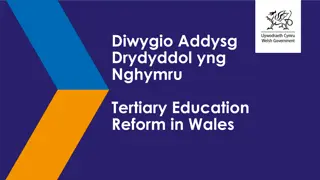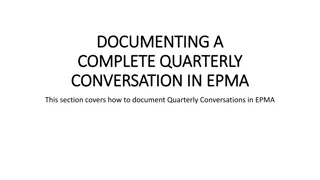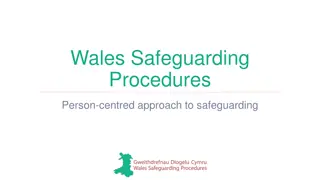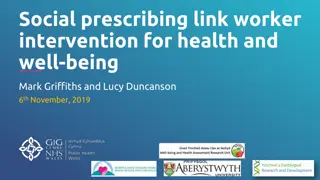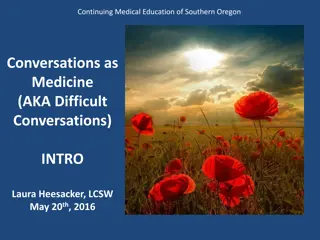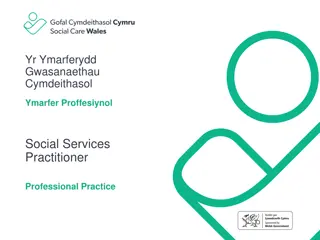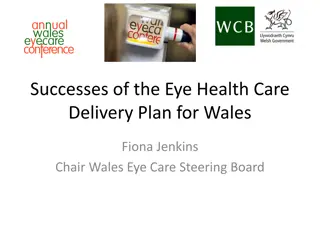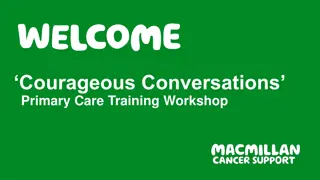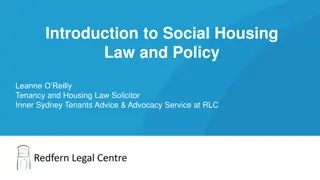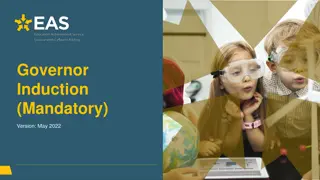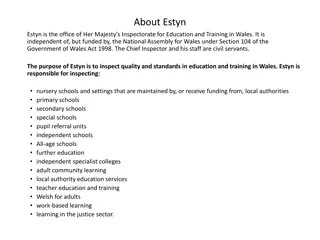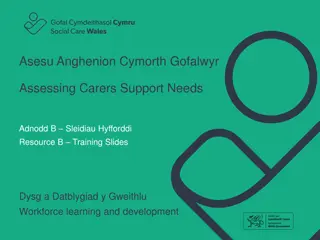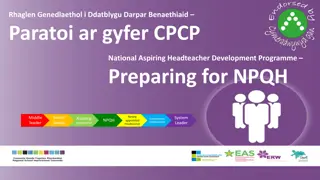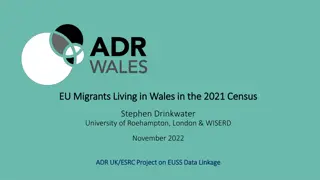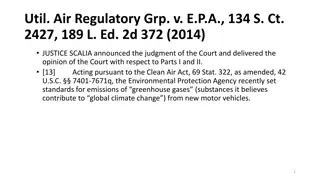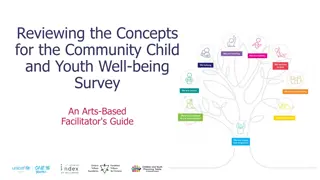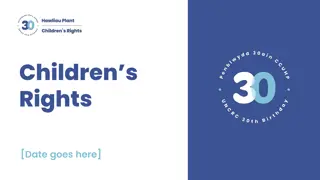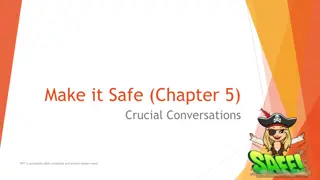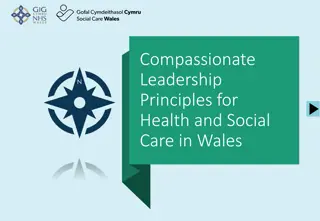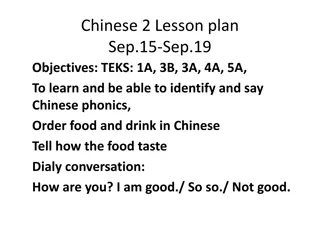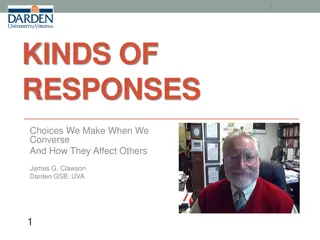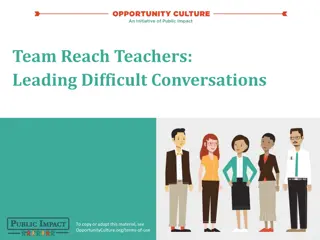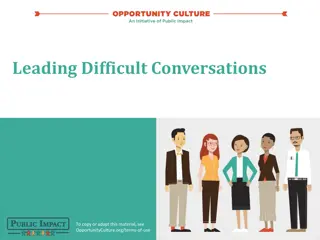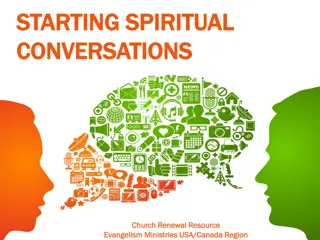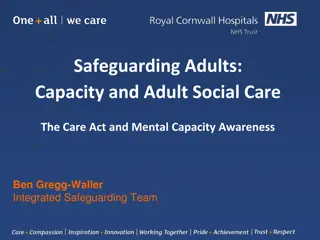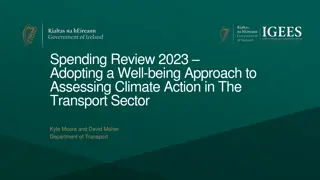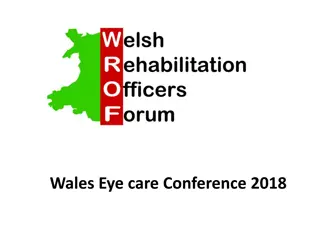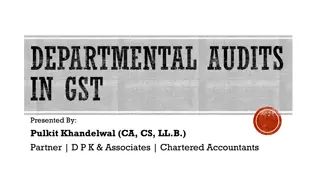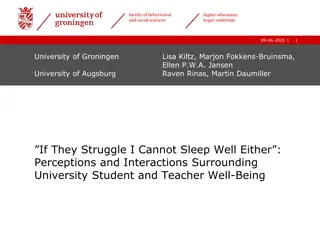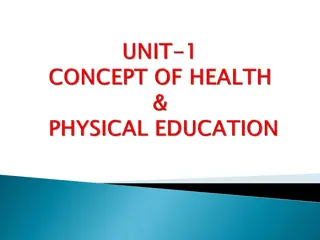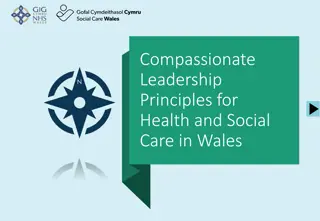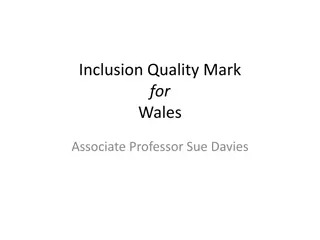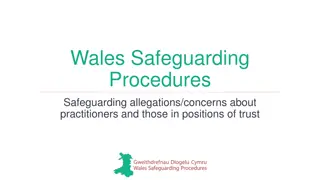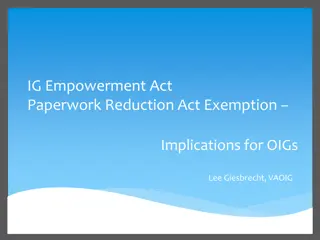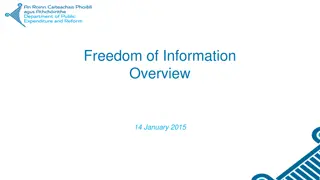Enhancing Conversations in Social Services under the Social Services and Well-being (Wales) Act 2014
Resource pack and workshop materials for managers and workers focusing on improving conversations in information, advice, and assistance services in alignment with the Social Services and Well-being (Wales) Act 2014. The content emphasizes the importance of skilled listening, exploring organizational buy-in, understanding key questions for service improvement, and providing context for information, advice, and assistance. Strategies for creating enriching interactions with individuals are highlighted, promoting effective communication and support within service provision.
Download Presentation

Please find below an Image/Link to download the presentation.
The content on the website is provided AS IS for your information and personal use only. It may not be sold, licensed, or shared on other websites without obtaining consent from the author. Download presentation by click this link. If you encounter any issues during the download, it is possible that the publisher has removed the file from their server.
E N D
Presentation Transcript
Social Services and Well-being (Wales) Act 2014 Better Conversations in Information, Advice and Assistance Services Resource pack for managers
Introduction to the resources Resource pack for managers Skills based pack for workers
Section 1 Our own experience
Aims of workshop Explore the organisational buy-in needed to have better and different conversations with our public and professional colleagues. Explore the skills required of workers (by sampling exercises). Agree plan for sustaining change.
Key questions to explore i) Are we clear about what the Act says about the 3 elements of Information, Advice and Assistance? ii) What do we think it means for Information, Advice and Assistance Services within our organisation? iii) What might be the key changes to our operational, management and quality control aspects need to be?
Context for Information, Advice and Assistance Responding to a wide range of requests Increasing demand and limited time Having to identify what matters most to the individual Giving the right response Feeling safe Feeling good about how well you do your job Providing IAA face to face or via the phone
5, 15 or 50 minutes Whether we have 5 minutes or 5 hours, skilled listening is vital. Skilled staff enables people to clarify their thinking and express what matters most to them. If we believe this, we need to create environments which allow staff to practise in this way. We win AND the individual and family win. Myth: It does not necessarily need a significantly longer period of time to have an empowering / strengths based conversation with somebody. It can just depend where you start!
If we start the conversation with a series of questions, how are we making people feel? : - confused, under pressure, feeling they might fail the assessment , and that they have to exaggerate the issue in order in to get a service. If we start the conversation simply by listening and empathising and reflecting, we can get alongside somebody. People value being heard and then we might for example, go on to ask what if anything happened today to prompt them to pick up the phone.
What might be the consequence of continuing to be driven primarily by the idea of eligibility criteria and service led assessments as the basis of our interaction with people who come to us for help?
Section 2 Vision for the service
What is the vision for your IAA Service Do other professionals understand the part they need to play? Do you know what your IAA service looks like or needs to look like? If yes, how do you know? Can you describe it to other colleagues? If no, what needs to happen so you do? Can you describe it to your customers? Why can or can t you describe it? And what needs to happen so you can? Do other professionals know what you re trying to do? If no, what would help them better understand?
Who is impacted upon by the expected developments for IAA? How might each stakeholder be impacted upon? Elected members The public Council wide departments Senior managers Customer services Statutory assessment and social work teams 3rd sector partners Provider services Health partners
Realising your ambition for IAA: key questions / considerations What needs to change and be supported? Structure, systems, recording outcomes, staff skills base, the conversation , targets. What are the blocks that need to be addressed or removed to allow staff to operate effectively? What might they need to be replaced with? Who is responsible for each of the aspects above? What does the relationship with social work teams need to look like? How do we ensure the experience of the interaction for individuals is mirrored across teams (the experience pathway)?
Section 3 Better conversations
Best Outcomes from Best Beginnings The principles and approaches of the Better Conversations Training
Key elements What are the most important elements of effective communication from your experience?
The key elements of good communication Showing that you are listening Expressing empathy and warmth Asking the right questions so there is clarity about concerns Showing support by recognition of individuals strengths Showing patience Appearing knowledgeable and effective
Relationship based practice How we think about someone or something affects what we do about it; we are all influenced by our individual moral code. do managers agree? Our approach to the issue therefore affects the outcome. do managers agree? As IAA, we are engaged in a dynamic process and in any encounter between a worker and an individual, there should always be two people learning! do managers agree? why and how might that be? The result should be self-empowering for the family or individual.
First point of contact and the emotions our staff manage on a daily basis People are most often calling at a time of stress and challenge. They may be very clear about what they need and why. but They may also be confused, anxious, frightened, angry, frustrated. They need help and time to reflect, hear themselves talk and start to become clearer.
Experiencing Behaviour Change Individuals NOT information make decisions. If we do decide to act, unless we have made the decision ourselves we may be unlikely to sustain it. We all have unique circumstances which feed into our decisions to act or not.
Imagine Something you feel you need to tackle, for example: Work / life balance Eating Exercise Parenting Relationship with a friend Supporting elderly parents Drink less wine
Empathy and openness Evidence based practice, experience and research show us that adopting an empathetic approach during our conversations result in:- less resistance and more disclosure
Much of the frontline training focuses on understanding the key elements of a good conversation Listening Exploring Reflecting Focussing Summarising
Effective practitioners Do Make a commitment Stay calm and purposeful Stay focussed on the most important issues Acknowledge the challenge and feelings Build on the strengths Explore individual s hopes and aspirations Respect individual s skills, knowledge and expertise Try to avoid Rescuing, advising, telling or doing to rather than with .
5 stages of the conversation 1. Open engaging questions 2. Active listening 3. Open exploratory questions 4. Information exchange 5. Summary and Actions
Section 4 Outcomes
What are outcomes? How do we introduce and maintain a focus on outcomes in our organisation?
A personal outcome is about the impact of the intervention for an individual. i.e. for personal outcomes think impact. e.g. I feel better about myself because I can wash myself safely and don t have to rely on others. e.g. I need to know my kids sleep safely at night.
A service outcome is often about the delivery of the service to an individual. e.g. 84 year old man successfully supported to live at home independently through fitting of necessary adaptations. e.g. Woman and children safely rehoused and supported through resettlement programme.
IAA outcomes checklist Remember personal outcomes have to be: Realistic Achievable Described through actions Impacting Sustainable
Suggested checklist Individual will discuss more with family members. Individual will gather more information and ring again. Individual will think about things a bit more before deciding on any action. Individual will contact a suggested service following signposting from frontline staff. Frontline will offer further contact. Frontline will offer / access more specialist advice. Frontline will refer into the organisation or another service for specialist help.
Developmental considerations to measuring outcomes An approach to measuring outcomes needs to: evidence the impact of the approach; support the conversation, rather than drive or hinder it; be easy to understand and use; enable local analysis of quality and satisfaction; align with existing or developing management processes; apply to all client groups; and be described as far as possible in the language of the individual.
Possible measures of success Short term Level of stated satisfaction (person) Level of perceived satisfaction (worker) Medium term Numbers of complaints / compliments Numbers of appropriate referrals onto other services Reduced number of NFA visits at SW assessment Longer term Partner agency feedback Worker satisfaction surveys Public satisfaction surveys
Section 5 Sustainability
Sustainability Things to consider Is your approach to IAA understood throughout the department? Do you have corporate support for a different way of working? Consider whether your system drives or supports practice. What needs to change? Before training, plan follow-up sessions that can maintain the momentum of the approach e.g. front-line session once a week (peer support space where a positive case can be brought and discussed learning from each other). Your team leader needs to be fully up-to-speed and able to support staff who get stuck . Relationship between IAA and specialist teams needs to be agreed. A strengths led approach should be continued by specialist teams, giving consistency of experience to the individual.
Next steps Where do you need to start and with what or whom? Finally - making a commitment What I will notice myself doing? What I will notice others doing?
